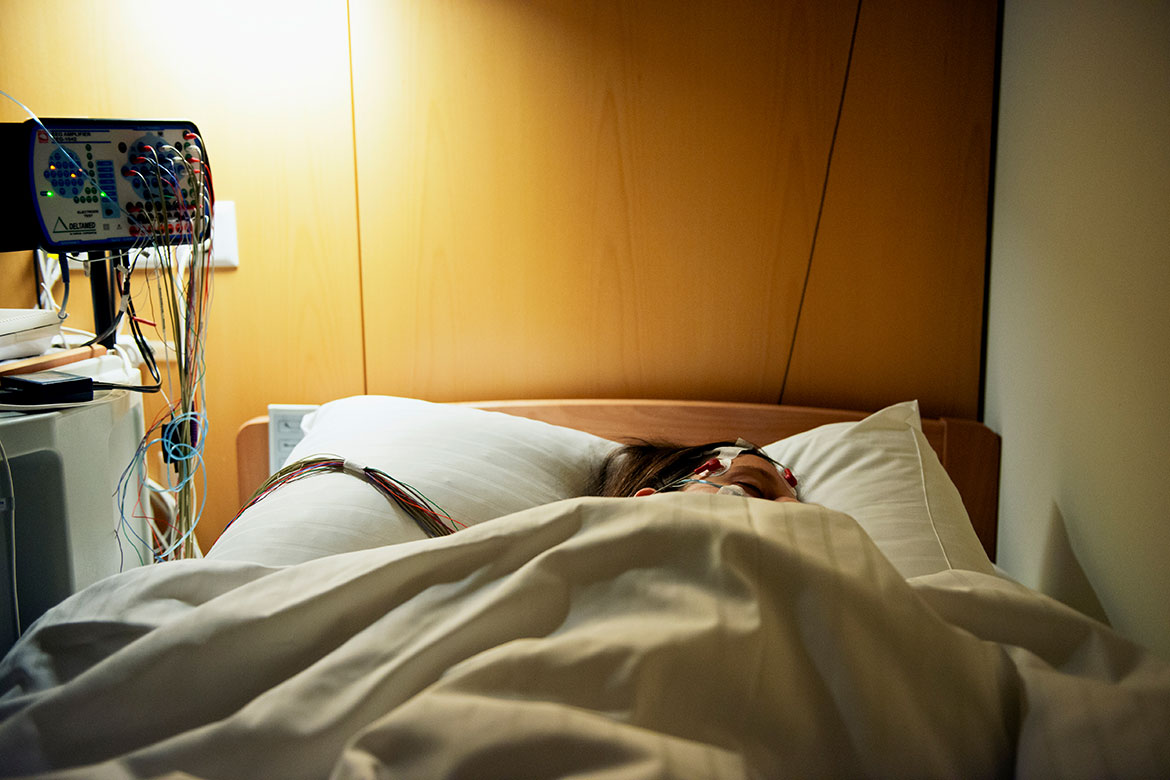IN THE SLEEP LAB
Morpheus advances science
Unravelling the final mysteries of sleep has scientists observing volunteers who spend their nights sleeping in laboratories. I was one of them on a Tuesday in January.

When we sleep, our memory still functions. That’s one reason why researchers hook up test subjects and observe what happens in their brain when they’re in the realm of dreams. | Image: Daniel Auf der Maur/13 Photo
Today, my job is to sleep, and not just anywhere, but in the sleep laboratory at the University of Fribourg. I find this original and rather exciting. Unlike the volunteers who participate in real studies and spend the whole night, however, I’m only playing the role of a guinea pig for the time it takes to have a nap. But you never know! If I fall asleep, my brain activity may prove useful to science.
It’s 11:30 a.m. and I have an appointment with Björn Rasch, who runs the sleep lab. He leads me into the basement to a small room with high ceilings and some basic equipment: a desk and two computers for analysing the recordings taken from test subjects. To the right and left are two soundproofed sleep booths, one of which is reserved for me and my nap. I stick my head in to see. It’s rather cute and well organised and the bed seems comfortable. On the other hand, it’s not suited for claustrophobes, because there’s neither much space nor light.
It takes the first half hour for two assistants to equip me with a battery of electrodes. There are two on my forehead, two on my temples, two at the back of my head, two under my chin, and one at the top of my skull. Once they are properly attached – a time-consuming process – they will measure the electrical activity of my brain and the movements of my eyes, according to my muscles. They will then show on the electroencephalogram whether I am awake or asleep, and in which of the phases of sleep. From now on, my room for manoeuvre is limited; I’m hooked up by a multitude of wires to a box that I have to carry with me. Now the intimacy of my mind is an open book for the researchers. But that doesn’t mean they can read my thoughts...
Replaying the score to consolidate it
We are not quite at that level yet. Above all, scientists today are seeking to understand sleep better, as it’s a state that still conceals a number of mysteries. Particularly, its mechanisms are still not very well known. At the University of Zurich, Hans-Peter Landolt is looking into this very question by deciphering the molecular functioning of sleep regulation in healthy people. They are studying regulation, because although “sleep is certainly a different state from wakefulness, […] it cannot be studied without taking wakefulness into account and vice versa”, says Landolt.
By now it’s 12:15 p.m. I’m still wide awake when I’m told that I’ll be in the left booth. I have 40 minutes. One of the assistants closes the door, turns off the light, and reminds me I can always call by pressing the button on the bedside table if I have a problem. Personally, I’m not sure why I would, but I guess feeling safe is important for a good night’s sleep in the lab and for providing scientists with relevant data, unbiased by the stress of the unknown.
According to Rasch, our thoughts can indeed influence our sleep. “For example, we have been able to show that we can force ourselves to sleep badly just by thinking”, he says. Rasch uses his laboratory to understand how our thoughts, ideas and emotions influence our sleep, and how this knowledge can be used to improve our daily lives, including our sleep.
His research has led him to suggest a hypothesis. It’s based on the link between sleep and memory and aims to explain why thoughts may influence sleep. We already know that information learned just prior to sleep is then reactivated in it, improving our ability to memorise that same information. “According to my proposed hypothesis, the thoughts we have just prior to sleep are also reactivated in it”. Depending on the nature of these thoughts, the body’s response is positive or negative, which influences sleep.
Hiking further in our dreams
I lie down on the bed, place the bundle of wires to one side and immediately forget I am in a laboratory. It’s dark, there’s no noise, and I’m hot. All that’s left is to close my eyes. With this time to myself, I let my thoughts wander. In fact, at this stage, I don’t know if I’m already asleep: Am I consciously thinking about hiking last weekend or am I reliving it in my dreams? It’s quite possible, according to the neuroscientist Sophie Schwartz from the University of Geneva’s Faculty of Medicine. She and her team use the sleep state as a tool to enhance our understanding of the processes involved in memory and learning.
She is also interested in the sorting of information that happens during sleep, but with a view to understanding its finer points. Schwartz illustrates the mechanism as follows: Let’s imagine we’re meeting someone for the first time. We are confronted by a new face whose physical characteristics we will remember. In fact, we will not only add this face to the stock of face representations contained in our memory, but also compare and reconfigure them. The new one might turn out to be more angular than one memorised face, thinner than another, and so on.
“Sleep is an ideal occasion for this remodelling process, mainly because the regions so used by the brain are not busy processing other information, unlike when we’re awake”, says Schwartz. These same mechanisms partly explain why our dreams very frequently contain recent additions to our memories, mixed with older elements. So it’s entirely possible that I did dream about my hiking trip, if not today, then on a previous night.
Schwartz is hoping to find out how, during sleep, certain memories are prioritised for reactivation. In particular it’s those that activate the reward system during wakefulness. “It’s hardly surprising! Humans, like other animals, have had every interest in remembering positive experiences in order to increase their chances of survival throughout evolution, for example, places where food is abundant. What Schwartz and her team are now showing is that the same neural networks can be activated during wakefulness and then during sleep when the score is replayed.
Informative sleepless nights
The door to my booth opens, and the light comes on. It’s far too early for my liking; I feel as if I’ve only just begun the experience! But Rasch confirms my time is indeed up. He asks me the same question I’m asking myself: Did I sleep? To be honest, I don’t know. On the computer, my brainwave activity and eye movements speak for themselves. I had been switching between deep relaxation and the first phase of sleep. “But all the time spent in the sleep phase is lost to memory. That’s why you have the impression that time has flown”, he tells me.
I doubt that my EEG has provided the scientist with any new research leads, but I do feel like I’ve had a rest, which is something. For subjects in sleep studies, this is not always be the case, as scientists are also interested in sleep deprivation, for example, how it affects cognitive functioning during wakefulness. Studies have already shown that people react differently to a lack of sleep. “I am trying to find out whether these differences have a genetic origin”, says Landolt. In one example, he is trying to establish whether they may be explained by dopamine, which is known to have an effect on certain central brain processes, e.g., movement control, emotional responses, addiction and pain, but whose role in the regulation of wakefulness and sleep remains unknown.
When sleep deprivation helps
In humans, and using molecular imaging tools, Landolt was also able to demonstrate that, after a night’s sleep deprivation, the number of specific receptors for glutamate – an excitatory neurotransmitter in the brain – was greater during the waking phase than after a normal night’s sleep. And after a night of recovery, it too returned to normal. “These receptors probably contribute to the molecular machinery governing the sleep-wake balance”, he says. This discovery could have practical applications. We know that people suffering from depression feel better when they are deprived of sleep, and Landolt believes the explanation lies in these receptors. If that proves to be the case, it might open up a major field, speeding up the development of effective drugs against depression.
To achieve this, and to shed light on the other mysteries of sleep, there are many more sheep to be counted by volunteers in the lab.




